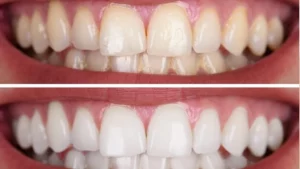Hyaluronic acid has become quite the buzzword in skincare routines. We’re all seeking radiant, smooth skin, and this ingredient promises just that. But, let’s talk about a common concern: Can hyaluronic acid cause acne? The idea of something meant to help your skin causing breakouts can be worrisome.
In this article, we’ll break down this question and provide you with clear, straightforward information. Acne, those pesky bumps and blemishes, is something we all want to avoid or manage effectively.
The Role of Hyaluronic Acid in Skincare
Boosting Hydration
The main job of hyaluronic acid in skincare is to provide hydration. It’s like giving your skin a big drink of water, helping to reduce the appearance of fine lines and wrinkles.
Enhancing Skin Texture
By retaining water, hyaluronic acid can temporarily plump up the skin, minimizing the look of uneven texture and giving you that sought-after smoothness.
Improving Skin Elasticity
Well-hydrated skin appears more elastic and youthful. Hyaluronic acid’s hydrating effects contribute to the overall bounce and resilience of your skin.

Addressing the Acne Question
Considering Acne Concerns
Now, let’s get to the heart of the matter: Can hyaluronic acid cause acne? While hyaluronic acid itself isn’t typically associated with causing acne, there are factors to consider. Acne can arise from various sources, including genetics, hormones, and clogged pores.
Read More; Lack of Melatonin in Skin: The Unseen Effects
Possible Scenarios
In some cases, if a product containing hyaluronic acid also includes ingredients that clog pores or trigger breakouts for your skin type, it could indirectly contribute to acne. However, the hyaluronic acid component itself isn’t the direct cause.
Individual Variations
Skin is unique, and what works for one person might not work for another. Some individuals might find their skin reacts well to hyaluronic acid, while others might experience breakouts due to different factors.
Can Hyaluronic Acid Cause Acne?
Acne Basics
Acne occurs when hair follicles become clogged with oil, dead skin cells, and bacteria. This can result in various types of blemishes such as whiteheads, blackheads, pimples, and even deeper cysts.
Factors at Play
Acne development is influenced by a combination of factors including genetics, hormones, bacteria, and the skin’s natural oil production.
Hormonal changes, like those during puberty or menstruation, can contribute to increased oil production and thus, potential acne breakouts.
Hyaluronic Acid’s Role
Hyaluronic Acid and Clogged Pores
Hyaluronic acid itself doesn’t clog pores or lead to acne directly. In fact, its lightweight texture usually makes it a safe choice for many skin types. Unlike heavier oils, it doesn’t tend to contribute to the formation of comedones (clogged pores).
Moisture and Skin Barrier
Hyaluronic acid’s primary function is to hydrate and maintain moisture balance in the skin. It helps to fortify the skin’s natural barrier, which is crucial in preventing excessive moisture loss and external irritants from getting in.
Potential Scenarios and Acne
Ingredients Matter
While hyaluronic acid is generally acne-friendly, it’s important to check the ingredient list of the products you’re using.
Some skincare products might combine hyaluronic acid with other ingredients that can trigger breakouts in sensitive individuals.
Product Formulation
For instance, if a product contains comedogenic (pore-clogging) ingredients alongside hyaluronic acid, it could increase the risk of acne formation. However, this is more about the overall formulation of the product than hyaluronic acid itself.
Read More: How Spoiled Child Liquid Collagen Defies Ageing
Individual Skin Reactions
Varied Responses
Individual skin responses to skincare products can vary widely. Some people might notice no issues when using hyaluronic acid, while others might experience breakouts due to unrelated factors or sensitivities.
Skin Type Matters
Skin type plays a role too. People with oily or acne-prone skin might benefit from lighter formulations of hyaluronic acid to avoid any potential for excess oiliness.

Navigating Hyaluronic Acid and Acne Concerns
Patch Testing
Testing the Waters
If you’re concerned about whether hyaluronic acid suits your skin, try patch testing. Apply a small amount of the product on a small area of your skin and observe for a few days. This can help you gauge any adverse reactions before applying it to your entire face.
Professional Guidance
Consulting a Dermatologist
If you’re consistently experiencing breakouts and suspect that hyaluronic acid might be a factor, seeking advice from a dermatologist is wise. They can analyze your skin, understand your routine, and provide tailored suggestions.
Hyaluronic Acid’s Impact on Different Skin Types
The Versatility of Hyaluronic Acid
Skin Types Overview
Our skin falls into various categories, such as oily, dry, combination, and sensitive. Hyaluronic acid’s versatility lies in its ability to benefit most of these skin types in unique ways.
Oily Skin
Balancing Hydration
For those with oily skin, maintaining the right moisture balance is key. Hyaluronic acid can offer lightweight hydration without making the skin feel greasy. This can potentially help reduce the skin’s tendency to produce excess oil.
Non-Comedogenic Nature
Hyaluronic acid’s non-comedogenic nature means it’s unlikely to clog pores, which is particularly beneficial for those prone to acne.
Dry Skin
Intense Hydration
Dry skin tends to lack moisture, leading to discomfort and flakiness. Hyaluronic acid’s exceptional ability to retain water makes it a superstar for delivering intense hydration, promoting smoother and more supple skin.
Plumping Effects
By attracting and holding moisture, hyaluronic acid can temporarily plump up fine lines and wrinkles, giving the skin a more youthful appearance.
Read More: Does Vaseline Kill Scabies? Don’t Use Without Knowing
Combination Skin
Targeted Hydration
Combination skin can be tricky, with some areas oily and others dry. Hyaluronic acid’s adaptive nature means it can provide hydration where it’s needed most, without overloading oilier areas.
Balancing Act
Using hyaluronic acid in moderation can help balance the skin’s overall hydration levels, minimizing the contrast between dry and oily patches.
Sensitive Skin
Gentle Hydration
Sensitive skin requires extra care. Hyaluronic acid’s gentle, lightweight formula is often well-tolerated and can provide much-needed hydration without causing irritation.
Soothing Properties
Hyaluronic acid’s hydrating effect can help calm sensitive skin by reducing the sensation of tightness or discomfort.
Normal Skin
Maintaining Balance
Even if you have normal skin, hyaluronic acid can be a valuable addition to your routine. It helps maintain your skin’s natural moisture equilibrium, promoting overall skin health.
Preserving Youthfulness
By keeping the skin hydrated, hyaluronic acid can contribute to preserving a youthful appearance and preventing premature signs of aging.
Tailoring Hyaluronic Acid to Your Skin
Product Formulations
Finding the Right Product
Different products contain varying concentrations of hyaluronic acid. Individuals with oily skin might prefer lighter formulations, while those with dry skin might opt for more concentrated options.
Combining Ingredients
Enhancing Benefits
Consider combining hyaluronic acid with other ingredients that address specific skin concerns. For instance, pairing it with antioxidants can provide a more comprehensive approach to skincare.
Read More: The Magical Touch of Cashmere Vanilla Magnesium Stick: You Won’t Believe It!
Addressing Acne Concerns
Steps to Take If You Suspect Hyaluronic Acid is Causing Acne
Suspecting a Connection
If you notice an increase in acne after introducing hyaluronic acid to your routine, it’s natural to wonder if there’s a link. While it’s uncommon for hyaluronic acid itself to cause acne, there are measures you can take to investigate further.
Evaluate Your Entire Routine
Consider Other Factors
Take a holistic view of your skincare routine. Are there any new products or changes that could be contributing to acne? Sometimes, the interaction between different products can lead to unexpected skin reactions.
Pause and Observe
Temporary Break
Temporarily halt the use of hyaluronic acid-containing products. Observe your skin’s behavior during this break. If the acne subsides, it might suggest a potential connection.
Reintroduce Gradually
A Gentle Approach
If you suspect hyaluronic acid, reintroduce it slowly after the break. Apply a small amount and monitor your skin’s response over a period of time.
Seek Professional Advice
Consult a Dermatologist
If acne continues to be a concern, seeking guidance from a dermatologist is advisable. They can help identify the root cause of your acne and provide tailored recommendations.
Making Informed Decisions
Understanding Acne Triggers
Individual Sensitivities
Acne triggers can vary widely among individuals. What causes breakouts for one person might not affect another in the same way.
Product Formulation Matters
Beyond Hyaluronic Acid
Keep in mind that the entire product formulation matters. While hyaluronic acid is often safe, other ingredients in the product could be contributing to acne.
Balanced Skincare
Comprehensive Approach
Addressing acne concerns isn’t just about removing one ingredient. It’s about maintaining a balanced skincare routine that addresses your skin’s specific needs.
Final Thoughts
Listen to Your Skin
Your Skin’s Voice
Your skin communicates its needs and preferences. Paying attention to its feedback and adjusting your routine accordingly is key to achieving healthy, clear skin.
Read More: Dark Reality of Dark Energy Pre Workout for Sale
Patience and Persistence
Finding Solutions
Addressing acne concerns requires patience. It might take time to identify the cause and find a solution that works for you.
Conclusion
In the journey towards healthier skin, understanding the relationship between hyaluronic acid and acne is pivotal.
While hyaluronic acid is generally safe and beneficial, it’s unlikely to directly cause acne. Instead, factors like product formulation and individual skin responses play a significant role.
By tailoring your skincare routine to your skin type and listening to its cues, you can make informed decisions that promote clear and radiant skin.
If concerns persist, consulting a dermatologist ensures personalized guidance for your skincare journey.
Remember, patience and attentiveness are key as you navigate the intricate balance between achieving hydration and managing acne.
Frequently Asked Questions (FAQs)
Can hyaluronic acid cause acne on its own?
Hyaluronic acid itself is unlikely to cause acne. It’s generally well-tolerated and often beneficial for skin hydration.
Could hyaluronic acid-containing products lead to breakouts?
While hyaluronic acid is generally safe, other ingredients in a product’s formulation could contribute to breakouts, especially in sensitive individuals.
Should I stop using hyaluronic acid if I notice acne?
Temporarily discontinuing hyaluronic acid can help determine if it’s contributing to acne. Reintroducing it gradually allows you to monitor your skin’s reaction.
Can hyaluronic acid aggravate existing acne?
Hyaluronic acid’s non-comedogenic nature makes it less likely to worsen existing acne. However, individual responses can vary.
Is it necessary to patch test products with hyaluronic acid?
Patch testing is a good practice for any new skincare product, including those with hyaluronic acid. It helps identify potential adverse reactions.
Can hyaluronic acid be used with other acne-fighting ingredients?
Yes, hyaluronic acid can be combined with other acne-fighting ingredients like salicylic acid or benzoyl peroxide, promoting balanced skincare.
Is hyaluronic acid suitable for sensitive skin prone to acne?
Hyaluronic acid’s gentle nature makes it suitable for many sensitive skin types. However, individual sensitivities should be considered.
Can hyaluronic acid help with acne scars?
Hyaluronic acid’s hydrating properties can improve overall skin texture and appearance, but it may not be a primary solution for treating acne scars.
Should I consult a dermatologist if I suspect hyaluronic acid is causing acne?
Yes, if acne persists or worsens, seeking professional advice is recommended. A dermatologist can provide tailored guidance and solutions.
Medical References
- Chien AL, Kang S. Mechanisms and treatments of photoaging. Photodermatol Photoimmunol Photomed. 2014;30(4):154-161.
- Papakonstantinou E, Roth M, Karakiulakis G. Hyaluronic acid: A key molecule in skin aging. Dermatoendocrinol. 2012;4(3):253-258.
- Rawlings AV. Trends in stratum corneum research and the management of dry skin conditions. Int J Cosmet Sci. 2003;25(1-2):63-95.
- Del Rosso JQ. The role of skin care as an integral component in the management of acne vulgaris: Part 1: The importance of cleanser and moisturizer ingredients, design, and product selection. J Clin Aesthet Dermatol. 2013;6(12):19-27.
- Mukherjee S, Date A, Patravale V, Korting HC, Roeder A, Weindl G. Retinoids in the treatment of skin aging: an overview of clinical efficacy and safety. Clin Interv Aging. 2006;1(4):327-348.
- Del Rosso JQ, Levin J. The clinical relevance of maintaining the functional integrity of the stratum corneum in both healthy and disease-affected skin. J Clin Aesthet Dermatol. 2011;4(9):22-42.



